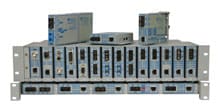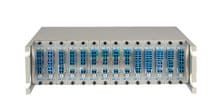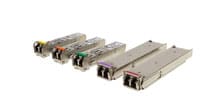- Products
- Product Lines
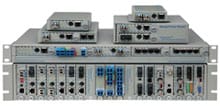
- iConverter Managed Multi-service Platform
- Copper to Fiber Media Converters
- Ethernet Media Converters
- 10 Gigabit Copper-to-Fiber
- 10/100/1000 Copper to 10 Gigabit Fiber
- 10/100/1000 Copper-to-Fiber with Integrated Management
- 10/100/1000 Industrial Copper-to-Fiber with Integrated Management
- 10/100/1000 Copper-to-Fiber with VLAN
- 10/100/1000 Dual Media Converter with VLAN
- Gigabit Copper-to-Fiber
- 10/100 Copper-to-Fiber with Integrated Management
- 10/100 Industrial Copper-to-Fiber with Integrated Management
- 10/100 Copper-to-Fiber with VLAN
- 10/100 Copper-to-Fiber
- Fast Ethernet Copper-to-Fiber
- Fast Ethernet Redundant Links
- 10Mbps Copper-to-Fiber
- 10Mbps Copper to Coax
- TDM Media Converters
- Serial Media Converters
- Ethernet Media Converters
- Fiber to Fiber Media Converters
- 10 Gigabit Fiber-to-Fiber Converter and Transponder
- 10 Gigabit Industrial Converter and Transponder
- SFP-to-SFP Fiber Converter and Transponder
- SFP-to-SFP Industrial Fiber Converter and Transponder
- Gigabit Fiber to-Fiber with 3 Rs
- 100/1000 Fiber-to-Fiber with 3 Rs
- Gigabit Fiber-to-Fiber
- Fast Ethernet Fiber-to-Fiber with 3 Rs
- Fast Ethernet Fiber-to-Fiber
- OC-3/STM-1 Fiber-to-Fiber
- OC-12/STM-4 Fiber-to-Fiber
- Carrier Ethernet Network Interface Devices
- CE 2.0 - 10G Demarcation NID
- CE 2.0 - 10G Demarcation and Aggregation NID
- CE 2.0 - 10/100/1000 Mult-port NID
- CE 2.0 - 10/100/1000 Mult-port NID with PoE
- CE 2.0 - 10/100/1000 8-Port NID
- SFP NID - Gigabit SFP NID
- microNID - 100/1000 compact NID
- CE 1.0 Service OAM - 10/100/1000 NID
- CE 1.0 Link OAM - 10/100/1000 Copper-to-Fiber NID
- CE 1.0 Link OAM - 10/100 Copper-to-Fiber NID
- CE 1.0 Link OAM - Gigabit Fiber-to-Fiber NID
- CE 1.0 Link OAM - Fast Ethernet Fiber-to-Fiber NID
- CWDM Multiplexers
- T1/E1 Multiplexers
- Ethernet Switch Modules
- Management System
- Chassis Options

- 1-Module Industrial Chassis
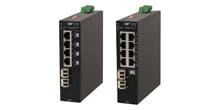
- RuggedNet Industrial Switches and Extenders
- Industrial PoE PSE Fiber Switches
- Multi-Gigabit Managed Industrial PoE+/BT Switches
- Multi-Gigabit Unmanaged Industrial PoE+/BT Switches
- 10G Managed 802.3bt PoE Switches
- 10G Unmanaged 802.3bt PoE Switches
- 10G Managed PoE+ Switches
- 10G Unmanaged PoE+ Switches
- 1G Managed PoE+ Switches
- 1G Unmanaged PoE+ Switches
- 1G Unmanaged 802.3bt PoE Switches
- 1G Managed 802.3bt PoE Switches
- Industrial Ethernet Switches
- Industrial PoE Copper Extenders
- Industrial Power Supplies

- OmniConverter Media Converter, Switches and Extenders
- PoE PSE Media Converters
- 10/100/1000 Multi-port PoE Media Converter
- 10/100/1000 Multi-port High-Power PoE Media Converter
- 10G Multi-Gigabit / Multi-Rate PoE Media Converter
- 10G Multi-Gigabit / Multi-Rate Media Converter
- Industrial 10/100/1000 Multi-port PoE Media Converter
- 10/100/1000 Cost-Effective Multi-port PoE Media Converter
- 10/100 Multi-port PoE Media Converter
- Industrial 10/100 Multi-port PoE Media Converter
- 1U Rack-Mount Shelf
- 10/100 Cost-Effective Multi-port PoE Media Converter
- PoE PSE Compact Switches
- Multi-Gigabit Managed PoE+/BT Switches
- Multi-Gigabit Unmanaged PoE+/BT Switches
- 10G Managed 802.3bt PoE Switches
- 10G Unmanaged 802.3bt PoE Switches
- 10G Managed PoE+ Switches
- 10G Unmanaged PoE+ Switches
- 1G Managed PoE+ Switches
- 1G Unmanaged PoE+ Switches
- 1G Managed 802.3bt PoE Switches
- 1G Unmanaged 802.3bt PoE Switches
- Ethernet Switches
- PoE Copper Extenders
- PoE Injectors
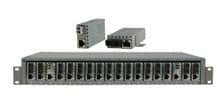
- miConverter Unmanaged Miniature Media Converters
- 10/100/1000 Copper-to-Fiber
- Industrial 10/100/1000 Copper-to-Fiber
- 10/100/1000 Ultra-Compact Copper-to-Fiber
- Gigabit Copper-to-Fiber
- 10/100/1000 Copper-to-Fiber PoE Powered
- 10/100 Copper-to-Fiber
- 10/100 Ultra-Compact Copper-to-Fiber
- 10/100 Copper-to-Fiber PoE Powered
- 18-Module Chassis
- Industrial 10/100 Copper-to-Fiber PoE Powered
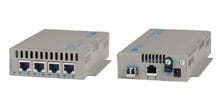
- FlexSwitch Compact Switches
- Solutions
- Company
- Resources
- Downloads
- Omnitron Product Catalog
- White Papers
- Visio Stencils
- BICSI Continuing Education Credits
- Earn CECs with free online videos
- Get a Quote
- Support
What is an Ethernet Extender?
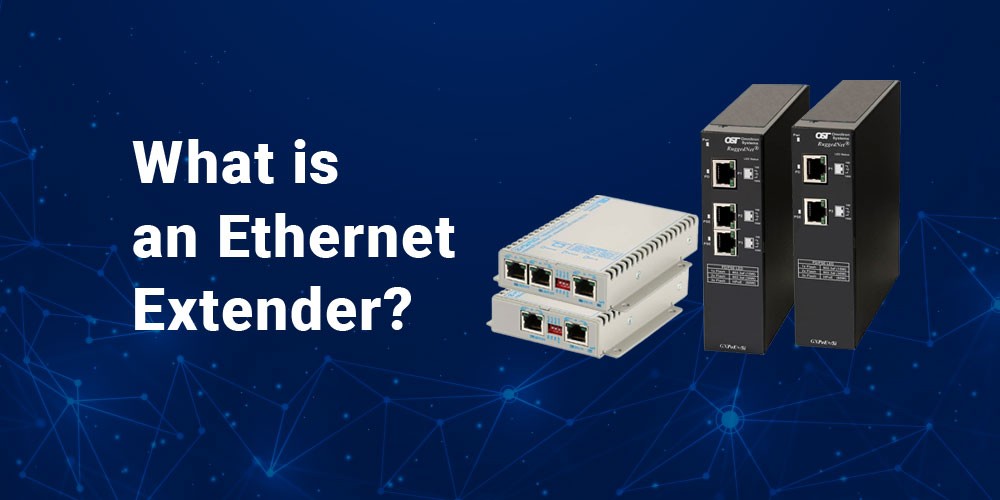
An Ethernet extender is a device that extends the reach of an Ethernet network beyond its standard distance limitation of 100 meters. Ethernet extenders are also known as network extenders or LAN extenders. They use various technologies to transmit Ethernet data over longer distances, including copper wire, fiber optic cable, and wireless.
Ethernet extenders are often used when running Ethernet cable over the required distance is not feasible or cost-effective. For example, an Ethernet extender might connect two buildings too far apart to be connected directly by an Ethernet cable. Or, an Ethernet extender might extend an Ethernet network to a remote area of a large building or campus.
Types of Ethernet Extenders
Various types of Ethernet extenders are available, each with advantages and disadvantages. Some of the most common types of Ethernet extenders include:
- Copper-based Ethernet Extenders: These extenders use existing copper wiring, such as telephone lines or coaxial cables, to transmit Ethernet data. Copper-based Ethernet extenders are relatively inexpensive and easy to install. Still, they may need to be able to provide the same speed and performance as other types of Ethernet extenders.
- Fiber optic Ethernet Extenders: These extenders use fiber optic cables to transmit Ethernet data. Fiber optic Ethernet extenders can provide very high speeds and performance, but they can be more expensive and difficult to install than copper-based Ethernet extenders.
When to use an Ethernet Extender
Ethernet extenders can be used in a variety of situations, including:
- To connect two or more buildings that are too far apart to be connected by Ethernet cable directly.
- To extend an Ethernet network to a remote area of a large building or campus.
- To provide Ethernet connectivity to devices located in areas where it is not possible or practical to run Ethernet cable, such as outdoors or in areas with difficult access.
- Create a temporary Ethernet network for a trade show or event.
- To troubleshoot Ethernet network problems.
Benefits of using an Ethernet Extender
There are several benefits to using an Ethernet extender, including:
- Extend the reach of an Ethernet network beyond its standard distance limitation of 100 meters
- Provide Ethernet connectivity to devices located in areas where it is not possible or practical to run Ethernet cables
- Create a temporary Ethernet network for a trade show or event
- Troubleshoot Ethernet network problems
- Improve the performance of an Ethernet network by reducing latency and jitter
- Increase the reliability of an Ethernet network by providing redundancy
How to choose an Ethernet Extender
When choosing an Ethernet extender, there are several factors to consider, including:
- Distance: How far do you need to extend the Ethernet network?
- Speed: What speed do you need the Ethernet extender to support?
- Budget: How much are you willing to spend on an Ethernet extender?
- Ease of installation: How easy is the Ethernet extender to install?
- Operating Temperature: Will the Ethernet extender be installed outdoors or indoors
- Features: What features, such as PoE support or management capabilities, are important to you?
FAQs
Are Ethernet Extenders Compatible With All Types of Cabling?
Ethernet extenders showcase their versatility by seamlessly integrating with various cable types, whether copper, coaxial, or speed-demon fiber optic cables.
Do Ethernet Extenders Reduce Speed?
No, Ethernet extenders, when chosen wisely to match your network's needs, generally do not reduce speed. In fact, they can enhance speed and performance by mitigating latency and jitter issues, ensuring a smoother and more efficient data transfer.
Which Is Better: Ethernet or Wi-Fi Extender?
The choice between Ethernet and Wi-Fi extenders depends on your specific requirements. Ethernet extenders are ideal for stable, high-performance connections over longer distances. In contrast, Wi-Fi extenders are more convenient for wireless setups, providing flexibility in areas where running cables is impractical. Consider your priorities—speed, stability, or flexibility—when deciding between the two.
Conclusion
Ethernet extenders are a valuable tool for extending the reach and improving the performance of Ethernet networks. When choosing an Ethernet extender, it is important to consider your network requirements.
If you are considering using Ethernet extenders, contact Omnitron Systems to get pre-sale support. We are available 24 hours a day, 7 days a week, and 365 days a year, to answer your questions.
Omnitron Systems is a US manufacturer of Ethernet extenders for commercial and industrial temperature installations. The OmniConverter extenders are powered by PoE and suitable for extending Ethernet in temperature controlled environments. The RuggedNet Industrial extenders are ideal for industrial or harsh environments (-40° to 75°C).
RuggedNet and OmniConverter PoE Extenders are plug-and-play devices that support auto-negotiation of data rates and duplex modes for simple in-line installation to instantly extend network distances. They provide cost-effective distance extension and connectivity to remote Ethernet devices where external power is not available or hard to provision, or when replacing copper with fiber becomes cost prohibitive.
Call us now to discuss your next Ethernet extender application. We are here to help!

